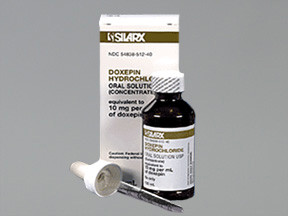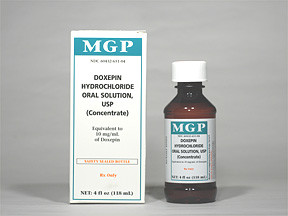DOXEPIN LIQUID - ORAL
PHONETIC PRONUNCIATION: (DOX-e-pin)
COMMON BRAND NAME(S): Sinequan
GENERIC NAME(S): doxepin HCl
Uses
USES: This medication is used to treat mental/mood problems such as depression and anxiety. It may help improve mood and feelings of well-being, relieve anxiety and tension, help you sleep better, and increase your energy level. This medication belongs to a class of medications called tricyclic antidepressants. It works by affecting the balance of certain natural chemicals (neurotransmitters) in the brain.
How to use DOXEPIN LIQUID - ORAL
HOW TO USE: Read the Medication Guide provided by your pharmacist before you start taking doxepin and each time you get a refill. If you have any questions, consult your doctor or pharmacist. Take this medication by mouth, usually 1 to 3 times daily or as directed by your doctor. If you take it only once a day, take it at bedtime to reduce daytime sleepiness. The dosage is based on your medical condition and response to treatment. To reduce your risk of side effects (such as drowsiness, dry mouth, dizziness), your doctor may direct you to start this medication at a low dose and gradually increase your dose. Follow your doctor's instructions carefully. Use the dropper that comes with the medication to measure out the prescribed amount. Just before taking, mix the drug with half a glass (4 ounces or 120 milliliters) of water or milk, or orange, grapefruit, tomato, prune or pineapple juice, and drink all of the mixture. Do not mix with soda or other carbonated beverages. If you are taking this medication in combination with liquid methadone, you may mix both drugs with lemonade, orange juice, sugar water, orange drink mix, or plain water, but not grape juice. Mix only what you need for each dose. Do not prepare a supply for future use. Take this medication regularly in order to get the most benefit from it. To help you remember, take it at the same time(s) each day. Do not increase your dose or use this drug more often or for longer than prescribed. Your condition will not improve any faster, and your risk of side effects will increase. It is important to continue taking this medication even if you feel well. Do not stop taking this medication without consulting your doctor. Some conditions may become worse when this drug is suddenly stopped. Also, you may experience symptoms such as mood swings, headache, and tiredness. To prevent these symptoms while you are stopping treatment with this drug, your doctor may reduce your dose gradually. Consult your doctor or pharmacist for more details. Report any new or worsening symptoms right away. This medication may not work right away. You may see some benefit within a week. However, it may take up to 3 weeks before you feel the full effect. Tell your doctor if your condition persists or worsens (such as your feelings of sadness get worse, or you have thoughts of suicide).
Side Effects
Precautions
Interactions
Overdose
Images
Reviews
Faq for DOXEPIN LIQUID - ORAL
Doxepin Liquid is an oral medication used to treat anxiety, depression, and insomnia.
Doxepin Liquid works by affecting certain natural substances in the brain, such as serotonin and histamine, which helps improve mood, reduce anxiety, and promote better sleep.
Common side effects of Doxepin Liquid may include drowsiness, dizziness, dry mouth, blurred vision, constipation, and weight gain.
Doxepin Liquid should be taken exactly as prescribed by your doctor. It is usually taken in divided doses throughout the day, and the dosage may vary depending on your condition. Follow the instructions provided by your doctor or pharmacist.
It is generally advised to avoid alcohol while taking Doxepin Liquid, as it can increase the sedative effects and worsen side effects such as drowsiness or dizziness.
Doxepin Liquid is usually not recommended for use in children under the age of 12, as its safety and effectiveness in this age group have not been established. However, your doctor may prescribe it under certain circumstances.
The full effects of Doxepin Liquid may not be felt immediately. It can take several weeks for the medication to reach its full therapeutic potential. It is important to continue taking it as prescribed, even if you do not notice immediate improvements.
No, you should not abruptly stop taking Doxepin Liquid without consulting your doctor. Stopping this medication suddenly can lead to withdrawal symptoms. Your doctor will advise you on how to gradually reduce the dosage before discontinuing it.
Doxepin Liquid may interact with other medications, including MAO inhibitors, other antidepressants, sedatives, antihistamines, and certain medications for high blood pressure. It is important to inform your doctor about all the medications you are taking to avoid any potential complications.
Warning
WARNING: Antidepressant medications are used to treat a variety of conditions, including depression and other mental/mood disorders. These medications can help prevent suicidal thoughts/attempts and provide other important benefits. However, studies have shown that a small number of people (especially people younger than 25) who take antidepressants for any condition may experience worsening depression, other mental/mood symptoms, or suicidal thoughts/attempts. Therefore, it is very important to talk with the doctor about the risks and benefits of antidepressant medication (especially for people younger than 25), even if treatment is not for a mental/mood condition. Tell the doctor right away if you notice worsening depression/other psychiatric conditions, unusual behavior changes (including possible suicidal thoughts/attempts), or other mental/mood changes (including new/worsening anxiety, panic attacks, trouble sleeping, irritability, hostile/angry feelings, impulsive actions, severe restlessness, very rapid speech). Be especially watchful for these symptoms when a new antidepressant is started or when the dose is changed.
Disclaimer
IMPORTANT: HOW TO USE THIS INFORMATION: This is a summary and does NOT have all possible information about this product. This information does not assure that this product is safe, effective, or appropriate for you. This information is not individual medical advice and does not substitute for the advice of your health care professional. Always ask your health care professional for complete information about this product and your specific health needs.


No Reviews Yet